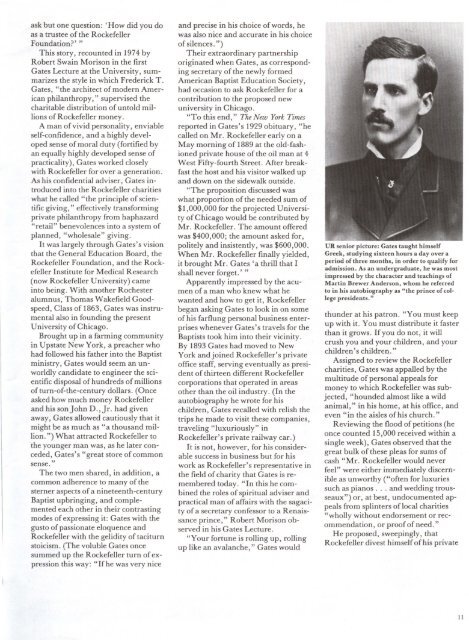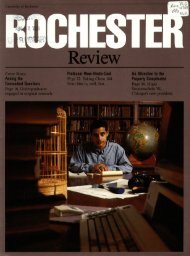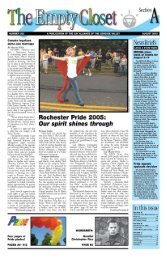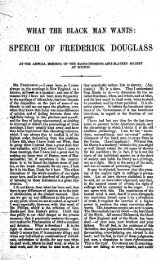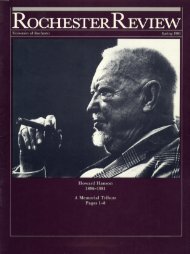Download PDF - University of Rochester Libraries
Download PDF - University of Rochester Libraries
Download PDF - University of Rochester Libraries
Create successful ePaper yourself
Turn your PDF publications into a flip-book with our unique Google optimized e-Paper software.
ask but one question: 'How did you do<br />
as a trustee <strong>of</strong> the Rockefeller<br />
Foundation?' "<br />
This story, recounted in 1974 by<br />
Robert Swain Morison in the first<br />
Gates Lecture at the <strong>University</strong>, summarizes<br />
the style in which Frederick T.<br />
Gates, "the architect <strong>of</strong> modern American<br />
philanthropy," supervised the<br />
charitable distribution <strong>of</strong> untold millions<br />
<strong>of</strong> Rockefeller money.<br />
A man <strong>of</strong> vivid personality, enviable<br />
self-confidence, and a highly developed<br />
sense <strong>of</strong> moral duty (fortified by<br />
an equally highly developed sense <strong>of</strong><br />
practicality), Gates worked closely<br />
with Rockefeller for over a generation.<br />
As his confidential adviser, Gates introduced<br />
into the Rockefeller charities<br />
what he called "the principle <strong>of</strong> scientific<br />
giving," effectively transforming<br />
private philanthropy from haphazard<br />
"retail" benevolences into a system <strong>of</strong><br />
planned, "wholesale" giving.<br />
It was largely through Gates's vision<br />
that the General Education Board, the<br />
Rockefeller Foundation, and the Rockefeller<br />
Institute for Medical Research<br />
(now Rockefeller <strong>University</strong>) came<br />
into being. With another <strong>Rochester</strong><br />
alumnus, Thomas Wakefield Goodspeed,<br />
Class <strong>of</strong> 1863, Gates was instrumental<br />
also in founding the present<br />
<strong>University</strong> <strong>of</strong> Chicago.<br />
Brought up in a farming community<br />
in Upstate N ew York, a preacher who<br />
had followed his father into the Ba:ptist<br />
ministry, Gates would seem an unworldly<br />
candidate to engineer the scientific<br />
disposal <strong>of</strong> hundreds <strong>of</strong> millions<br />
<strong>of</strong>turn-<strong>of</strong>-the-century dollars. (Once<br />
asked how much money Rockefeller<br />
and his son John D. ,J r. had given<br />
away, Gates allowed cautiously that it<br />
might be as much as "a thousand million.")<br />
What attracted Rockefeller to<br />
the younger man was, as he later conceded,<br />
Gates's "great store <strong>of</strong> common<br />
sense. "<br />
The two men shared, in addition, a<br />
common adherence to many <strong>of</strong> the<br />
sterner aspects <strong>of</strong> a nineteenth-century<br />
Baptist upbringing, and complemented<br />
each other in their contrasting<br />
modes <strong>of</strong> expressing it: Gates with the<br />
gusto <strong>of</strong> passionate eloquence and<br />
Rockefeller with the gelidity <strong>of</strong> taciturn<br />
stoicism. (The voluble Gates once<br />
summed up the Rockefeller turn <strong>of</strong> expression<br />
this way: "Ifhe was very nice<br />
and precise in his choice <strong>of</strong> words, he<br />
was also nice and accurate in his choice<br />
<strong>of</strong> silences. ")<br />
Their extraordinary partnership<br />
originated when Gates, as corresponding<br />
secretary <strong>of</strong> the newly formed<br />
American Baptist Education Society,<br />
had occasion to ask Rockefeller for a<br />
contribution to the proposed new<br />
university in Chicago.<br />
"To this end," The New York Times<br />
reported in Gates's 1929 obituary, "he<br />
called on Mr. Rockefeller early on a<br />
May morning <strong>of</strong> 1889 at the old-fashioned<br />
private house <strong>of</strong> the oil man at 4<br />
West Fifty-fourth Street. After breakfast<br />
the host and his visitor walked up<br />
and down on the sidewalk outside.<br />
"The proposition discussed was<br />
what proportion <strong>of</strong> the needed sum <strong>of</strong><br />
$1,000,000 for the projected <strong>University</strong><br />
<strong>of</strong> Chicago would be contributed by<br />
Mr. Rockefeller. The amount <strong>of</strong>fered<br />
was $400,000; the amount asked for,<br />
politely and insistently, was $600,000.<br />
When Mr. Rockefeller finally yielded,<br />
it brought Mr. Gates' a thrill that I<br />
shall never forget.' "<br />
Apparently impressed by the acumen<br />
<strong>of</strong> a man who knew what he<br />
wanted and how to get it, Rockefeller<br />
began asking Gates to look in on some<br />
<strong>of</strong> his farflung personal business enterprises<br />
whenever Gates's travels for the<br />
Baptists took him into their vicinity.<br />
By 1893 Gates had moved to New<br />
York and joined Rockefeller's private<br />
<strong>of</strong>fice staff, serving eventually as president<br />
<strong>of</strong> thirteen different Rockefeller<br />
corporations that operated in areas<br />
other than the oil industry. (In the<br />
autobiography he wrote for his<br />
children, Gates recalled with relish the<br />
trips he made to visit these companies,<br />
traveling "luxuriously" in<br />
Rockefeller's private railway car.)<br />
It is not, however, for his considerable<br />
success in business but for his<br />
work as Rockefeller's representative in<br />
the field <strong>of</strong> charity that Gates is remembered<br />
today. "In this he combined<br />
the roles <strong>of</strong> spiritual adviser and<br />
practical man <strong>of</strong> affairs with the sagacity<br />
<strong>of</strong> a secretary confessor to a Renaissance<br />
prince," Robert Morison observed<br />
in his Gates Lecture.<br />
"Your fortune is rolling up, rolling<br />
up like an avalanche," Gates would<br />
UR senior picture: Gates taught himself<br />
Greek, studying sixteen hours a day over a<br />
period <strong>of</strong> three months, in order to qualify for<br />
admission. As an undergraduate, he was most<br />
impressed by the character and teachings <strong>of</strong><br />
Martin Brewer Anderson, whom he referred<br />
to in his autobiography as "the prince <strong>of</strong> college<br />
presidents."<br />
thunder at his patron. "You must keep<br />
up with it. You must distribute it faster<br />
than it grows. If you do not, it will<br />
crush you and your children, and your<br />
children's children."<br />
Assigned to review the Rockefeller<br />
charities, Gates was appalled by the<br />
multitude <strong>of</strong> personal appeals for<br />
money to which Rockefeller was subjected,<br />
"hounded almost like a wild<br />
animal," in his home, at his <strong>of</strong>fice, and<br />
even "in the aisles <strong>of</strong> his church."<br />
Reviewing the flood <strong>of</strong> petitions (he<br />
once counted 15,000 received within a<br />
single week), Gates observed that the<br />
great bulk <strong>of</strong> these pleas for sums <strong>of</strong><br />
cash "Mr. Rockefeller would never<br />
feel" were either immediately discernible<br />
as unworthy ("<strong>of</strong>ten for luxuries<br />
such as pianos ... and wedding trousseaux")<br />
or, at best, undocumented appeals<br />
from splinters <strong>of</strong> local charities<br />
"wholly without endorsement or recommendation,<br />
or pro<strong>of</strong> <strong>of</strong> need. "<br />
He proposed, sweepingly, that<br />
Rockefeller divest himself <strong>of</strong> his private<br />
11


